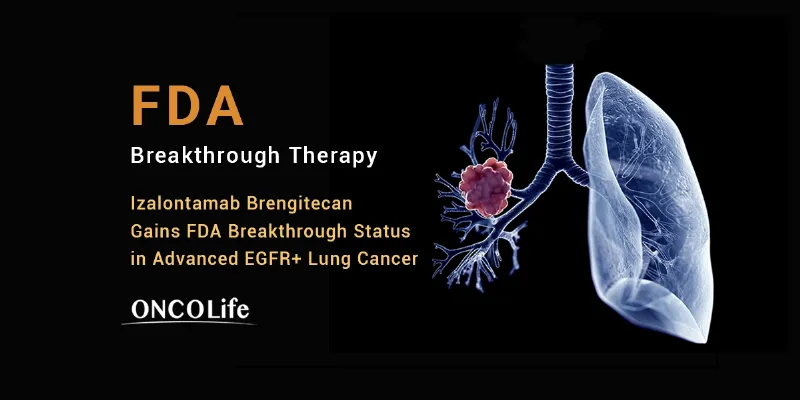FDA Grants Breakthrough Status to Izalontamab Brengitecan for EGF+ Lung Cancer

The FDA has granted Breakthrough Therapy Designation to izalontamab brengitecan (iza-bren), a first-in-class bispecific ADC targeting EGFR and HER3, for advanced non-small cell lung cancer (NSCLC) progressing after TKIs and platinum chemotherapy. Supported by data from three clinical trials, iza-bren showed promising efficacy with a manageable safety profile.
The U.S. Food and Drug Administration (FDA) has granted Breakthrough Therapy Designation (BTD) to izalontamab brengitecan (iza-bren), an investigational bispecific antibody-drug conjugate (ADC) targeting EGFR and HER3, for patients with advanced non-small cell lung cancer (NSCLC) harboring EGFR exon 19 deletions or exon 21 L858R substitutions who have progressed after EGFR tyrosine kinase inhibitors (TKIs) and platinum-based chemotherapy.
This marks the first BTD in the U.S. for SystImmune and Bristol Myers Squibb’s jointly developed agent, underscoring its potential as a novel therapeutic option in a setting where resistance and limited treatment choices remain significant challenges.
“The FDA’s granting of Breakthrough Therapy Designation underscores the potential of iza-bren to meaningfully improve clinical outcomes for patients with previously treated EGFR-mutation NSCLC,” said Dr. Jonathan Cheng, Chief Medical Officer of SystImmune. “The data we have generated to date suggest that iza-bren could address a critical unmet need in patient care.”
Addressing a Critical Unmet Need
EGFR mutations occur in roughly 10–15% of NSCLC cases in Western populations and up to 50% in Asian populations, predominantly in non-squamous histologies. While third-generation EGFR TKIs such as osimertinib have transformed frontline care, most patients experience disease progression within 18 months. Platinum-based chemotherapy remains the standard fallback, yet efficacy is modest and toxicities are substantial, leaving clinicians with few effective options.
Clinical Evidence Behind the Designation
The designation is supported by data from three ongoing trials:
- BL-B01D1-101 and BL-B01D1-203, conducted in China by Biokin;
- BL-B01D1-LUNG-101, a global study spanning the U.S., EU, and Japan.
Across these studies, iza-bren has demonstrated promising efficacy with a manageable safety profile in patients whose disease had progressed following third-generation EGFR TKIs and platinum-based chemotherapy.
A Dual-Targeting ADC With a Novel Mechanism
Iza-bren represents a potential first-in-class bispecific ADC. By simultaneously targeting EGFR and HER3—both key drivers of tumor growth and survival—it delivers a dual blockade of proliferative signaling. Once internalized, the antibody releases a topoisomerase I inhibitor payload, inducing genotoxic stress and cancer cell death. This combined mechanism positions iza-bren as a differentiated therapeutic candidate in the crowded landscape of ADCs.
SystImmune and Bristol Myers Squibb will continue advancing clinical development of iza-bren under their global collaboration, with Biokin leading efforts in China. The Breakthrough Therapy Designation is intended to accelerate regulatory review, raising hopes that patients with EGFR-mutant NSCLC may gain access to a new option sooner.











Comments
No Comments Yet!